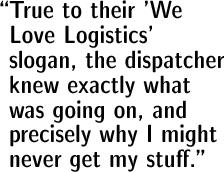UPS is Too Busy to Deliver my Amazon Shipments (And the Downfall of Western Society)
 After twice failing to deliver a two-day shipment from Amazon, UPS informed me last night that they were simply too busy to bring me my package at all.
After twice failing to deliver a two-day shipment from Amazon, UPS informed me last night that they were simply too busy to bring me my package at all.
This is a huge problem for me, because I use Amazon a lot.
As an author, I frequently order my own books to give as gifts from Amazon, because of the company’s winning combination of low prices; fast, cheap shipping; very convenient website; and superb customer service. For my research, Amazon is my preferred way to get the reference material I need. More generally, when I know what I want — and even sometimes when I don’t — I often find that Amazon is the best way to go.
Until now.
 Last night I had a conversation with my local UPS dispatcher, because the GSM World phone that I was supposed to receive on Monday hadn’t arrived by Tuesday night. The dispatcher explained that the drivers were overworked, and that DOT regulations required that the drivers come off the roads after driving for the whole day. Fair enough.
Last night I had a conversation with my local UPS dispatcher, because the GSM World phone that I was supposed to receive on Monday hadn’t arrived by Tuesday night. The dispatcher explained that the drivers were overworked, and that DOT regulations required that the drivers come off the roads after driving for the whole day. Fair enough.
“But surely my package, delayed from yesterday, will get priority today, won’t it?” I asked.
“No,” was the answer. Then the dispatcher told me that the driver still had 60 deliveries to make, which, he thought, would take 4 hours. It was 7:30pm. The driver would come off the road at 10:30pm. My package would probably be delayed a second time. True to their “We Love Logistics” slogan, the dispatcher knew exactly what was going on, and precisely why I might never get my stuff.
Now, it’s just a phone. (I want it because I’m traveling to Israel next week, and my current GSM phone doesn’t have a built-in GPS. I’m tired of getting lost in Israel, particularly in Jerusalem, which is literally built in non-Euclidean space.) This obviously isn’t worth risking the welfare of the driver, and I told the dispatcher as much.
So on the one hand, this is a prime example of the much mocked “first-world problem.” As an author and scholar living comfortably in the suburbs of New York, I might not get a device of convenience dropped off at my door as quickly as I’d like.
But on the other hand, I’m worried, because I see this as part of an increasing trend that leaves critical infrastructure in the hands of private companies whose motive (quite legitimately) is profit, not service.
We used to rely on the United States Postal Service (USPS) to send things, because, at least since the Romans, we’ve known that the ability to mail things to each other is an important ingredient in civilized life. This is why the USPS offered first-class mail even to remote locations, and even at a loss.
Similarly, and for similar reasons, we used to use a regulated phone network to communicate. The phone lines in this country were built to service everyone. And, I just heard, the system was designed to work 99.999% of the time, which is to say that outages would be limited to about 5 minutes a year.
But now most people where I live use Internet phones and cell phones, so they rely on local cable and wireless providers for communication. These companies, while regulated, are not required to offer any particular level of service, the thinking being that “the market” will ensure high enough quality.
Surprisingly, everyone was surprised during Hurricane Sandy when so many people were unable to communicate. The cable and wireless providers, it turned out, were making a lot of money by skimping on reliability.
Likewise, I now find that my default way of doing my daily business is in the hands of a company that, by its own admission, isn’t up to the task.
I grew up grateful that I didn’t live in one of the many countries where things didn’t work. But is the U.S on the path to becoming one of those countries?
(Incidentally, Amazon apologized profusely for the delay — in spite of it not being their fault — and credited me what I would have paid for shipping. UPS didn’t apologize, and blamed the DOT regulations and the number of packages. More on this interesting difference soon.)




I got an official e-mail reply from UPS. Here it is in its entirety:
Hard to believe. Their position is still that “the delays were unavoidable,” rather than, for example, “we are understaffed.”
From a managerial point, I completely get this. When I was the manager of a critical care area, I always staffed for my usual workload and census. When we got busy, I tried to call in extra staff, donned a pair of scrubs myself and made it work. But, even I have to admit, it would seem that Christmas is a predictable high volume time that should be planned for and staffed for. I wonder if more people than anticipated shopped online? We are rather rural and I find shopping online is an easier way to get just what I want.
[But surely my package, delayed from yesterday, will get priority today, won’t it?] No… unbelievable. This should be a yes…
Amazon apologized and refunded my shipping costs for an item listed on Amazon but sold through a different business when my item didn’t arrive on time too. I have never had a bad experience with their company.
I came across this blog by way of your “The Bible Says So” and Other Stupid Arguments post and sadly I do not possess the eloquence to tell you how thoroughly I am enjoying it.
However, I am greatly concerned by this post.
I’m not here to carry water for UPS or anyone else, and I have only a very basic understanding of this issue from scanning a couple headlines and articles, but I am astounded by this entitlement attitude.
Clearly, in your case, UPS dropped the ball, but I think this post begs the question, what is the alternative?
Without competition there’s no real incentive to perform as the USPS has demonstrated. Both UPS and FedEx have thrived in spite of a subsidized government monopoly on shipping precisely because they offer superior service. This has forced a dramatic increase in USPS quality largely thanks to UPS and FedEx.
Still the USPS is notorious for slow, expensive, rude service. There are countless stories of late deliveries on their end as well, but all I am reading is that greedy UPS doesn’t care about service they only care about profits. Where is the incentive for the USPS to outperform FedEx or UPS? My God, if it we looked to the government to solve all of our problems I wouldn’t be surprised if we were still delivering mail on horseback. And if this is the model which we would trust to supply us with all the necessities of modern life then certainly we would fall, and quickly. It’s been tried, and it’s failed. It’s quite a sad story.
Conversely, over the past century or so this country has dominated the globe – militarily, economically, scientifically, and culturally, thanks entirely to this engine of economic production we call free enterprise. And if examples are required I would be more than happy to supply them in great number and detail.
The bottom line is this…poverty is the natural state of mankind. The amazing thing is not that some packages weren’t delivered, it’s how we’ve gotten this far at all that is truly incredible. Is the US heading toward mediocrity? It would certainly seem so, and I would argue that it is exactly this type of entitlement thinking that is taking us there. But I’m hopeful.